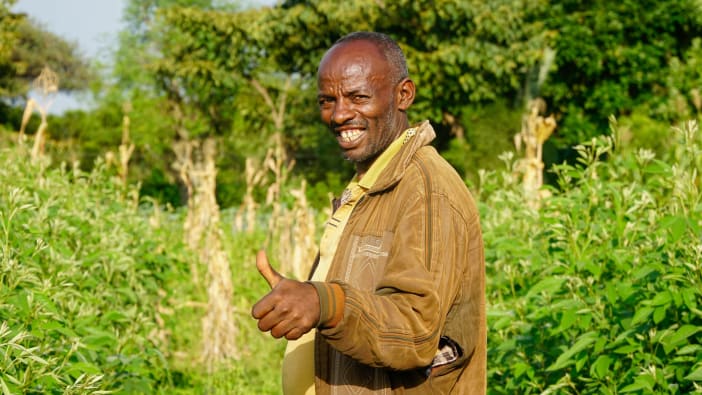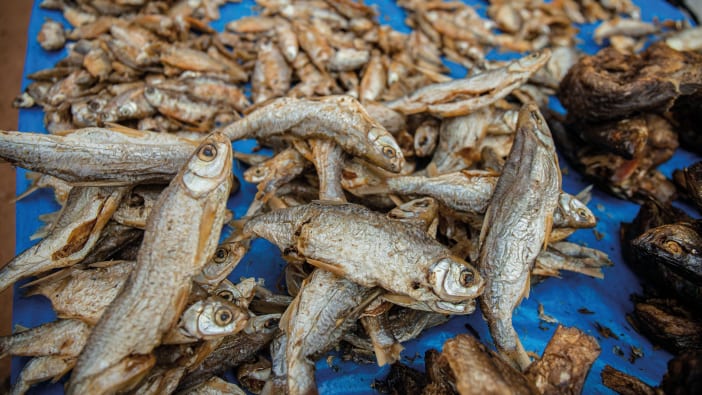by Martin Rowland.
Kagando Rural Development Centre is situated in the foothills of the Ruwenzori Mountains in Western Uganda. It started as a small hospital in 1965 and has continued to grow and develop since then.
A community health project was established and it was observed that the nutrition of the local people was sometimes poor. This led to the beginning of an agricultural extension programme, eight years ago, with the aim of helping people grow a better variety of food crops and improve other aspects of their agricultural activities. Equal emphasis is placed on three subjects:
- Care of the environment
- Cash crops
- Food crops
We include providing firewood in ‘Care of the environment’, and encourage farmers to plant trees to provide firewood for the future.
These three subjects are often closely related: for example, a crop of beans obviously provides food for the family but, if they are grown well with a good yield, the surplus can be sold as a cash crop. In the same way, when using a mulch to conserve water and increase the yield of tomatoes, soil erosion is also reduced, thus protecting the environment. So, instead of encouraging just one aspect of agriculture such as food crops, we try to encourage farmers to be aware of all three aspects and to see the links between them.
Members of the agricultural extension team travel from Kagando to visit nearly forty groups of farmers in the surrounding area. Because Kagando is situated in the foothills of a large mountain range, the land is hilly and sometimes quite steep. Soil erosion is a common problem. The growing population increases the pressure on land. Land is often used repeatedly without resting, resulting in reduced soil fertility and increased soil erosion. The demand for firewood results in many trees being cut down, again increasing the possibility of soil erosion.
The rains are usually good and reliable and there are two growing seasons each year. In general, the soil is fairly fertile and a wide range of crops can be grown. The staple food crops are matoke (bananas), cassava and beans. Traditional cash crops of coffee and cotton are common. Oil-seed crops such as sesame and sunflower are increasing in popularity. Kagando is able to process the sunflower seed into cooking oil. About 40 tonnes were processed last year.
As people have learnt from the community health programme about the importance of a balanced diet, many have been keen to learn how to grow crops such as soya, tomatoes, vegetables and various different fruits that can improve the diet. These crops can be grown close to the house and need only small areas of land in order to produce a reasonable amount of food. Indeed, some crops need virtually no land - passion fruit can be grown up existing trees which provide a good framework and enable heavy cropping to be achieved.
The community health workers and agricultural extension workers at Kagando teach people the importance of good nutrition. They show them how they can provide suitable foodstuffs from the small amount of land they have available, to provide a satisfying and balanced diet.
Yowasi Kamalha is the extension worker responsible for visiting the forty groups of farmers. He travels daily to different groups, visiting each group every five or six weeks. Members of the groups express appreciation for the help they are receiving and the knowledge they are gaining both about agriculture and about the Bible, as a result of the Bible studies that are held at each visit.
Yofesi Rwabulyanga is a farmer and member of one of the groups in the agricultural extension programme. He lives in the hills about ten kilometres from Kagando. He talked with Yowasi about his involvement in the programme:
‘During 1986 some visitors from Kagando came to visit me at my home in Kantale. They told me that the aim of the Kagando Agricultural Extension Programme was to give information on how to improve crop production and other agricultural topics. After this visit, I started growing tomatoes on a small scale. Before I grew my own, I had to buy from the market - now I even manage to sell the surplus ones. I managed to buy a good kettle and clothes for myself and my family, as well as having a healthier diet.
My home is on the hillside and I have about half a hectare of coffee next to my house. It was not yielding well and I asked the people from Kagando for advice.
They suggested that the soil was thin due to soil erosion and that I should dig contour ridges. They also advised that trees such as Leucaena and Sesbania sesbans should be planted on the ridge to make it stronger. I did these things and there has been a big change. The coffee is now healthier and more productive.
The agriculture team from Kagando have continued visiting our group since 1986 and given further advice and teaching about a variety of subjects. They taught us about keeping bees and I now have four local log hives and one improved box hive. My family have benefited by getting honey for home consumption and the surplus honey is sold to earn money for other home uses.
I am grateful for the work being done by the agriculture team from Kagando and I hope to continue improving my agricultural practices.’
Martin Rowland works with Tear Fund in Kagando, Uganda.









